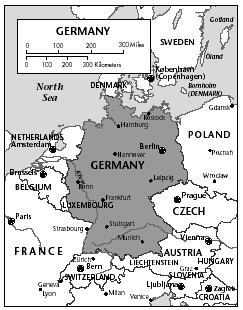Germany - Political background
Upon defeat of the Nazi Reich in 1945, the country was divided into four occupied zones controlled by the United States, Britain, France, and the USSR. Similarly, Berlin was divided into four occupied sectors. In 1949, the American, British, and French leaders decided to unite their zones to form the Federal Republic of Germany (FDR—West Germany), with Bonn as its capital. West Germany soon thereafter became integrated into the military and economic structures of the Western Alliance. The Soviet-occupied region became the German Democratic Republic (GDR—East Germany), with East Berlin as its capital. East Germany entered the communist bloc comprised of the USSR and other Central and Eastern European countries.
In 1989, following political upheavals in other communist Eastern European countries, popular protests erupted against the East German regime and its leader, Eric Honecker. A large number of East Germans fled to West Germany through neighboring countries. In an attempt to halt the exodus, East Germany closed its borders, setting off mass demonstrations in every major East German city. Without Soviet support, the collapse of the communist regime appeared imminent, and on 9 November 1989, the Berlin Wall began to be dismantled. The West German chancellor, Helmut Kohl, championed appeals for the reunification of Germany and began talks to outline how the two countries would unify. On 3 October 1990, Germany became unified and the first all-German elections took place the following December.
The Basic Law has been the constitution of West Germany since 1949, and continues to serve that purpose in the unified country. Germany is a federal state, with responsibilities divided between the federal government and the states (Länder). There are 16 Länder (10 from West Germany and six from East Germany). The head of state is the federal president, who is elected by a federal convention for a five-year term. The president serves primarily as a symbolic representative of the nation. In July 1999, Johannes Rau became the first Social Democratic president in 30 years.
Germany has a bicameral legislature consisting of the Federal Council (Bundesrat or upper house) and the National Assembly (Bundestag or lower house). Members of the Bundesrat are appointed by states with no set terms and represent states' interests in policy areas that fall under joint federal-state jurisdiction. The Bundesrat has veto power only on legislative matters that concern the states, legislative power rests primarily with the Bundestag. Members of the Bundestag are elected by universal suffrage to four-year terms, via a mixed direct and proportional electoral system whereby representatives are elected by individual districts and chosen by party lists. There were 603 seats in the Bundestag as of the September 2002 election.
The major political parties in Germany and their respective number of seats following the 2002 election are: the center-left Social Democratic Party (SPD) with 251 seats (down from 298 following the 1998 election); their coalition partner, the Greens the Greens with 55 (up from 47)s; the center-right Christian Democratic Party (CDU) and its sister party in Bavaria, the Christian Social Union (CSU) with 248 seats (up from 245); the liberal Free Democratic Party (FDP) with 47 (up from 44); and the Party of Democratic Socialism (PDS), the former East German Communist Party, with just 2 seats (PDS had entered the Bundestag for the first time in 1998 with 35 seats).
The head of government is the chancellor (Bundeskanzler), who is elected from the Bundestag and is usually the head of

the largest party or coalition. On 27 September 1998, Gerhard Schröder became chancellor-elect, ending Helmut Kohl's 16-year run as chancellor of Germany. In April 1999, he presided over the moving of the capital from Bonn back to Berlin. His reelection in 2002 was by the narrowest margin in a German election since World War II (1945).
Comment about this article, ask questions, or add new information about this topic: